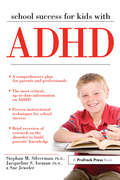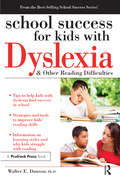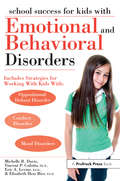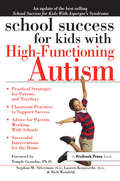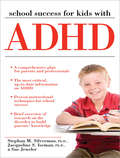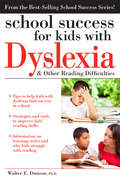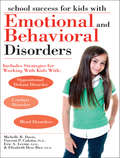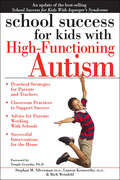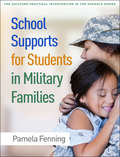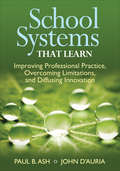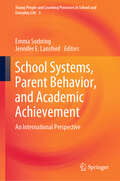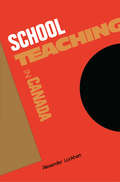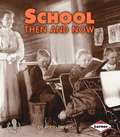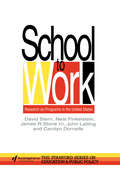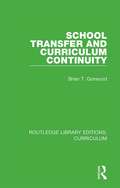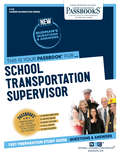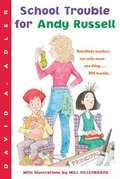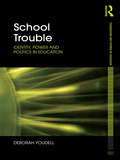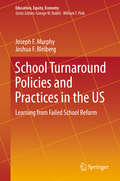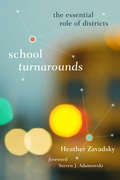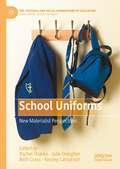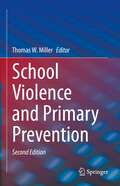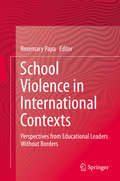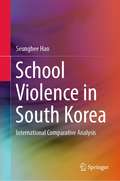- Table View
- List View
School Success for Kids With ADHD (School Success Ser.)
by Sue Jeweler Stephan M. Silverman Jacqueline S. IsemanSchool Success for Kids With ADHD offers parents and teachers the support they need to ensure that children with attention deficits build on their strengths, circumvent their weaknesses, and achieve to their fullest potential. With the growing number of children diagnosed with attention problems, parents and teachers need practical advice for helping these children succeed in school. Topics covered include recognizing the causes and types of attention deficits and how they appear in the school context, requesting school evaluations and diagnoses, understanding the laws regarding students with special needs, advocating for these students in the school environment, and coaching students with attention deficits to success. The authors also include a brief overview of research and medical perspectives on attention deficits, strategies used by teachers of children with ADHD, and helpful tools for parents and teachers to employ.
School Success for Kids With Dyslexia and Other Reading Difficulties
by Walter DunsonSchool Success for Kids With Dyslexia and Other Reading Difficulties provides parents and teachers with goals that will meet the needs of students who are struggling with reading, leading them to work through their difficulties and enjoy reading. It includes information, assessments, and techniques that parents, teachers, and school administrators can use immediately to foster reading success. Through an understanding of how English words are constructed, how the brain processes language, and the differences that exist between learning styles, parents and teachers will gain keen insight into the processes of reading, reading acquisition, and reading instruction. The book also covers topics such as how language skills can affect reading difficulties and how technology can be used to help students, and it provides a structured approach for parents to implement at home to help their struggling students find success.
School Success for Kids With Emotional and Behavioral Disorders
by Michelle R. Davis Vincent P. Culotta Eric A. LevineSchool Success for Kids With Emotional and Behavioral Disorders gives parents and teachers of students with Conduct Disorder, Oppositional Defiant Disorder, mood disorders, or other emotional and behavioral disorders the strategies they need to help these kids overcome their struggles and find success in school. Based on the experiences of psychologists and educators working with kids with these disorders, this book provides help for children needing to control their emotional outbursts and strategies to teach kids to monitor, review, and change their behaviors. The chapters cover topics such as managing the classroom, dealing with struggles with homework, choosing from options such as time out or restraint to control behavior, helping kids develop self-advocacy strategies and independence, and planning services and accommodations for these disorders. The book also includes multiple tools for parents and teachers to reproduce and use immediately to help their students with emotional and behavioral problems overcome their challenges.
School Success for Kids With High-Functioning Autism
by Rich Weinfeld Stephan M. Silverman Lauren KenworthySmart kids with autism spectrum disorders need specific interventions to find success in school and beyond. Featuring a foreword by Temple Grandin, School Success for Kids With High-Functioning Autism shares practical advice for implementing strategies proven to be effective in school for dealing with the“Big 10” obstacles, including social interactions, inflexibility, behavior issues, attention and organization, homework, and more.Based on the new criteria in the DSM-5, School Success for Kids With High-Functioning Autism also describes how autism spectrum disorder (ASD) and social communication disorders (SCD) will now identify the students formerly identified as having Asperger's syndrome, Nonverbal Learning Disorder, high-functioning autism, or PDD-NOS. Relying on the latest research, and presenting it in easy-to-understand and practical language, the authors identify how the key components of ASD and SCD will appear to parents and professionals and what steps should be taken once these signs are evident. This book is sure to help any parent or teacher wanting to see their smart kids with autism succeed!
School Success for Kids with ADHD
by Sue Jeweler Stephan M. Silverman Jacqueline S. IsemanTwo clinical psychologists and a K-12 teacher authored this text offering parents and teachers a clinical perspective on ADHD and strategies to manage its effect on study. Early chapters discuss how the disorder has been viewed historically and the importance of attention in academics. The authors go on to propose a multimodal management plan that involves assessment, medical monitoring, case management, educational supports, parental involvement, attention to the patient's diet, calming and relaxation techniques, and counseling, among other interventions. Also covered are best practices for teachers, support for ADHD patients in college, the role of technology in managing ADHD, and a review of alternative treatments parents can consider. Appendices contain supplementary tools for use with ADHD patients and a research summary. Annotation ©2009 Book News, Inc., Portland, OR (booknews.com)
School Success for Kids with Dyslexia and Other Reading Difficulties (School Success #0)
by Walter Dunson"School Success for Kids With Dyslexia and Other Reading Difficulties" provides parents and teachers with goals that will meet the needs of students who are struggling with reading, leading them to work through their reading difficulties and enjoy the task of reading. It includes information, assessments, and techniques that parents, teachers, and school administrators can use immediately to foster reading success. Through an understanding of how English words are constructed, how the brain processes language, and the differences that exist between learning styles, parents and teachers will gain keen insight into the processes of reading, reading acquisition, and reading instruction. The book also covers topics such as how emotions can affect reading difficulties and how technology can be used to help students and provides handy tips for parents to implement at home to help their struggling students find success.
School Success for Kids with Emotional and Behavioral Disorders
by Michelle R. DavisSchool Success for Kids With Emotional and Behavioral Disorders gives parents and teachers of students with conduct disorder, oppositional defiant disorder, mood disorders, or other emotional and behavioral disorders the strategies they need to help these kids overcome their struggles and find success in school. Based on the experiences of psychologists and educators working with kids with these disorders, this book provides help for children needing to control their emotional outbursts and strategies to teach kids to monitor, review, and change their behaviors.
School Success for Kids with High-Functioning Autism
by Rich Weinfeld Lauren Kenworthy Stephan SilvermanSmart kids with autism spectrum disorders need specific interventions to find success in school and beyond. School Success for Kids with High-Functioning Autism shares practical advice for implementing strategies proven to be effective in school for dealing with the "Big 10" obstacles, including social interactions, inflexibility, behavior issues, attention and organization, homework, and more. Based on the new criteria in the DSM-5, School Success for Kids with High-Functioning Autism also describes how autism spectrum disorder (ASD) and social communication disorders (SCD) will now identify the students formerly identified as having Asperger's syndrome, Nonverbal Learning Disorder, high-functioning autism, or PDD-NOS. Relying on the latest research presented in easy-to-understand and practical language, the authors identify how the key components of ASD and SCD will appear to parents and professionals and what steps should be taken once these signs are evident. This book is sure to help any parent or teacher wanting to see their smart kids with autism succeed!
School Supports for Students in Military Families (The Guilford Practical Intervention in the Schools Series)
by Pamela FenningHow does growing up in a military family affect the educational experiences of children and youth? What can K–12 school practitioners do to support these students' academic, behavioral, and social-emotional success? This book describes effective ways to help students and their families navigate such challenges as relocation, school transitions, and parental deployment. Pamela Fenning presents strengths-based assessment, intervention, and prevention strategies that reflect deep knowledge of military culture and fit perfectly within a schoolwide multi-tiered system of support (MTSS). In a convenient large-size format, the book includes a reproducible data collection form that can be downloaded and printed for repeated use. This book is in The Guilford Practical Intervention in the Schools Series, edited by Sandra M. Chafouleas.
School Systems That Learn: Improving Professional Practice, Overcoming Limitations, and Diffusing Innovation
by Paul B. Ash John P. D'AuriaWhen school systems learn, professional practice improves and student achievement increases Picture this: Teachers sharing insights and challenges. Principals leading with trust. Central office leaders inspiring and supporting principals. A synergistic learning system that results in all students succeeding. This practitioner's guide to creating a system-wide learning organization focuses on professional learning as the stimulus to improving student achievement. Experienced superintendents Paul Ash and John D'Auria provide a blueprint to: Improve schools through system-wide professional learning Increase student achievement by instilling a deep-rooted culture of curiosity Bolster faculty and staff morale with trust-building initiatives Align professional development with student-centered district standards
School Systems, Parent Behavior, and Academic Achievement: An International Perspective (Young People and Learning Processes in School and Everyday Life #3)
by Emma Sorbring Jennifer E. LansfordThis volume takes an international and multidisciplinary approach to understanding students’ academic achievement. It does so by integrating educational literature with developmental psychology and family studies perspectives. Each of the nine chapters focuses on a particular country: China, Colombia, Italy, Jordan, Kenya, the Philippines, Sweden, Thailand, or the United States. It describes the country as a cultural context, examines the current school system and parenting in light of the school system, and provides empirical evidence from that country regarding links between parenting and students’ academic achievement. The book highlights similarities and differences in education and parenting across these nine countries - all varying widely in socioeconomic and cultural factors that affect schools and families. The volume contributes to greater understanding of links between parenting and academic performance in different cultural groups. It sheds light on how school systems and parenting are embedded in larger cultural settings that have implications for students’ educational experiences and academic achievement. As two of the most important contexts in which children and adolescents spend time, understanding how schools and families jointly contribute to academic achievement holds promise for advancing the international agenda of promoting quality education for all.
School Teaching in Canada
by Alexander LockhartVirtually every Canadian has been influenced, for better or worse, by schoolteachers. Adults recall with clarity experiences with individual teachers; children are in contact with schoolteachers on a daily basis; parents know the importance of teachers in their children's lives. Teachers are the key component in the hotly debated, heavily funded education systems across the country. Theirs is a profession at the centre of often contradictory interests: pedagogic, political, professional, and public.Alexander Lockhart offers a survey of elementary and secondary schoolteachers and presents a profile of the profession as a whole. Among the topics he discusses are the characteristics of today's teachers, the conditions in which they work, their professional associations, career patterns in teaching, the political environment, current pedagogy, and the public interest.His findings reflect a profession in transition. In elementary schools two-thirds of teaching staff are women; in secondary schools two-thirds are men. Half of all Canada's teachers are at mid-career, aged 35-49, and near the top of their salary levels. Teachers' salaries have risen faster than the industrial composite in recent years, yet teachers are frustrated in their aspirations. As a group, Lockhart says, teachers have less autonomy than other professionals. Current policy directions and public attitudes aggravate this situation.Lockhart warns that the teaching profession is moving into crisis. The implications are serious, for our children, and for the quality of life throughout Canada as we look toward the twenty-first century.
School Then and Now (Then And Now)
by Robin NelsonThis book describes how school in the United States has changed through the years, including such topics as transportation, supplies, and subjects taught
School To Work: Research On Programs In The United States (Stanford Series On Education And Public Policy Ser. #No. 17)
by David Stern Neal Finkelstein James R. Stone John Latting Carolyn DornsifeAn in-depth investigation into career-related programmes in American secondary schools and two-year further education colleges is given in this book. In addition to reviewing evidence on the effectiveness of vocational coursework, the authors analyse programmes involving students who study and work simultaneously, including co-operative education, youth apprenticeship and school-based enterprise.; Chapters deal with the problems encountered in the school-to-work transition: the preparation necessary not only for this transition but for changes encountered when jobs end abruptly, and issues covered include combining school-based and work-based learning and teaching and linking secondary with post- secondary education. Research on programmes involving students simultaneously working and at school, including non-school-supervised employment is also covered, as is co-operative education, which places students in jobs related to their fields of study. The traditional elements of post-school education and training are discussed together with an investigation into newer approaches including career academics and career magnet schools and programmes bridging secondary and post secondary education. Additionally, selected studies of programmes for out- of-school youth are reviewed.; To conclude, the authors consider new school-to-work systems and whether specially designed programmes for the "non-college-bound" students would be stigmatised as second best, or if an alternative programme could maintain an option for students to attend four year colleges and universities, the latter making the design and operation of school-to-work systems more difficult. Of interest to administrators, teachers, policy makers, analysts and employers, the findings in this book will shed light on the viability of new school-to- work initiatives currently being implemented in the UK, Europe and USA.
School Transfer and Curriculum Continuity (Routledge Library Editions: Curriculum #11)
by Brian T. GorwoodOriginally published in 1986. Pupils, teachers and educationalists have contended with continuity difficulties for many years but the problem remains a major one not only in Britain but also throughout the world, including North America. This book examines the problem, assesses the steps being taken to minimise the problem and makes suggestions for improving practice. Continuity is considered both historically and in its 1980s context. The major emphasis is on strategies used at national, regional and school level to minimise difficulties children face when they change school - strategies such as teacher visits and exchanges, liaison committees and the use of transfer documents.
School Transportation Supervisor: Passbooks Study Guide (Career Examination Series #C-113)
by National Learning CorporationThe School Transportation Supervisor Passbook® prepares you for your test by allowing you to take practice exams in the subjects you need to study. It provides hundreds of questions and answers in the areas that will likely be covered on your upcoming exam.
School Trouble for Andy Russell
by David A. Adler Will HillenbrandAndy Russell tries--he really does. But his teacher, Ms. Roman, can be so boring. He daydreams in class and forgets about tests, and finally Ms. Roman has had enough. Andy always knew she had it in for him! But when Ms. Roman is out sick, Andy's class gets a fishy substitute teacher and things turn from bad to worse. Guess who is sent to the principal's office when someone starts playing tricks on the sub!
School Trouble: Identity, Power and Politics in Education (Foundations and Futures of Education)
by Deborah YoudellWhat is the trouble with schools and why should we want to make ‘school trouble’? Schooling is implicated in the making of educational and social exclusions and inequalities as well as the making of particular sorts of students and teachers. For this reason schools are important sites of counter- or radical- politics. In this book, Deborah Youdell brings together theories of counter-politics and radical traditions in education to make sense of the politics of daily life inside schools and explores a range of resources for thinking about and enacting political practices that make ‘school trouble’. The book offers a solid introduction to the much-debated issues of ‘intersectionality’ and the limits of identity politics and the relationship between schooling and the wider policy and political context. It pieces together a series of tools and tactics that might destabilize educational inequalities by unsettling the knowledges, meanings, practices, subjectivities and feelings that are normalized and privileged in the ‘business as usual’ of school life. Engaging with curriculum materials, teachers’ lesson plans and accounts of their pedagogy, and ethnographic observations of school practices, the book investigates a range of empirical examples of critical action in school, from overt political action pursued by educators to day-to-day pedagogic encounters between teachers and students. The book draws on the work of Michel Foucault, Judith Butler, Ernesto Laclau and Chantel Mouffe, and Gilles Deleuze and Felix Guattari to make sense of these practices and identify the political possibilities for educators who refuse to accept the everyday injustices and wide-reaching social inequalities that face us. School Trouble appears at a moment of political and economic flux and uncertainty, and when the policy moves that have promoted markets and private sector involvement in education around the globe have been subject to intense scrutiny and critique. Against this backdrop, renewed attention is being paid to the questions of how politics might be rejuvenated, how societies might be made fair, and what role education might have in pursing this. This book makes an important intervention into this terrain. By exploring a politics of discourse, an anti-identity politics, a politics of feeling, and a politics of becoming, it shows how the education assemblage can be unsettled and education can be re-imagined. The book will be of interest to advanced undergraduate and postgraduate students and scholars in the fields of education, sociology, cultural studies, and social and political science as well as to critical educators looking for new tools for thinking about their practice.
School Turnaround Policies and Practices in the US: Learning From Failed School Reform (Education, Equity, Economy Ser. #6)
by Joseph F. Murphy Joshua F. BleibergThis volume provides an analysis of what we know about turning around "failing" schools in the United States. It starts with an in-depth examination of the barriers that hinder action on turnaround work.The book analyses the reasons why some schools that find themselves in serious academic trouble fail in their efforts to turn themselves around. Beginning with a discussion of what may best be described as "lethal" reasons or the most powerful explanation for failed reform initiatives, which include an absence of attention to student care and support; a near absence of attention to curriculum and instruction; the firing of the wrong people. Covered in this volume are "critical" explanations for failed turnaround efforts such as failure to attend to issues of sustainability, and "significant" explanations for failed turnaround efforts such as the misuse of test data. The volume concludes by examining what can be done to overcome problems that cause failure for turnaround schools and reviewing ideas in the core technology of schooling: curriculum, instruction, and assessment. As well as exploring problems associated with the leadership and management of schools to see where improvement is possible and an analysis of opportunities found in relationships between schools and their external partners such as parents and community members.
School Turnarounds: The Essential Role of Districts
by Heather Zavadsky Steven J. AdamowskiThe inspiration for this book was a crucial observation: that if the school turnaround movement is to have widespread and lasting consequences, it will need to incorporate meaningful district involvement in its efforts. The result is a volume that considers school turnaround efforts at the district level, examining the evidence thus far and indicating fruitful directions for district-based initiatives going forward. At the heart of the book are case studies of districts--in Philadelphia, Charlotte-Mecklenburg, Denver, Sacramento, and Long Beach--that have developed systemwide policies and programs for instituting turnaround reforms in their member schools. These cases--and the book as a whole--bring district-based initiatives and options into the larger discussion of the turnaround movement and its potential for improving chronically low-performing schools.
School Turnarounds: The Essential Role of Districts (Educational Innovations Series)
by Heather ZavadskyThe inspiration for this book was a crucial observation: that if the school turnaround movement is to have widespread and lasting consequences, it will need to incorporate meaningful district involvement in its efforts. The result is a volume that considers school turnaround efforts at the district level, examining the evidence thus far and indicating fruitful directions for district-based initiatives going forward. At the heart of the book are case studies of districts—in Philadelphia, Charlotte-Mecklenburg, Denver, Sacramento, and Long Beach—that have developed systemwide policies and programs for instituting turnaround reforms in their member schools. These cases—and the book as a whole—bring district-based initiatives and options into the larger discussion of the turnaround movement and its potential for improving chronically low-performing schools.
School Uniforms: New Materialist Perspectives (The Cultural and Social Foundations of Education)
by Rachel Shanks Julie Ovington Beth Cross Ainsley CarnarvonThis edited volume brings together a new materialist approach to understanding the various legacies and controls being exercised through school uniforms. Through examining school uniform policies, the editors and their authors highlight the embodied choices that contribute to a socio-materialist understanding of democracy and social justice. Uniform policy plays a distinct role in setting the culture of compulsory school education and as such it constitutes a set of under-theorised school practices. This work thus brings together critical perspectives from education, sociology, cultural and postcolonial studies within an overarching analysis of how uniform imposes performances that have a formative effect on young people’s identities and economic positionality.
School Violence and Primary Prevention
by Thomas W. MillerThis important new work covers clinical issues in treating victims of school violence and assessing children with the potential for violence. The editor also examines the effectiveness of prevention intervention programs and offers larger policy recommendations. The book looks at environmental factors such as cultural issues on behaviors from bullying to mass school shootings. And uniquely, the book delves into topics such as sexual boundaries and body image. In all, this book aims for a theoretical and applied picture of the current state of school violence and prevention.
School Violence in International Contexts: Perspectives from Educational Leaders Without Borders
by Rosemary PapaThis international edited volume is a rare look at cultural, economic and political forces that contribute to school violence. In light of the devastating events in US schools and the violence towards students and schools world-wide, the war on knowledge development in non/secular education is increasing at an alarming rate. This book offers an international perspective on violence from both K-12 to tertiary levels, parents, administrators-teachers-support staff and research scholars in a desire to understand the contextual issues surrounding violence and its impacts on the field of education. ELWB Scholars and practitioners hail from six continents propose historical to futuristic perspectives linking violence towards education and its inhabitants while framing future strategies to alter multinational fear mongering to the decline of knowledge generation for an informed citizenry.
School Violence in South Korea: International Comparative Analysis
by Seunghee HanThis book examines school violence in South Korea from an international comparative perspective. It analyses nationally representative samples and provides extensive literature reviews based on academic journals, various social and educational magazines and major media articles on school violence in South Korea. This book includes major data sets for the analysis such as Trends in International Mathematics and Science Study and Nation Youth Policy Institute. These data show frequency, patterns and associated factors of school violence in South Korea and comparison of those in Japan and the United States.
